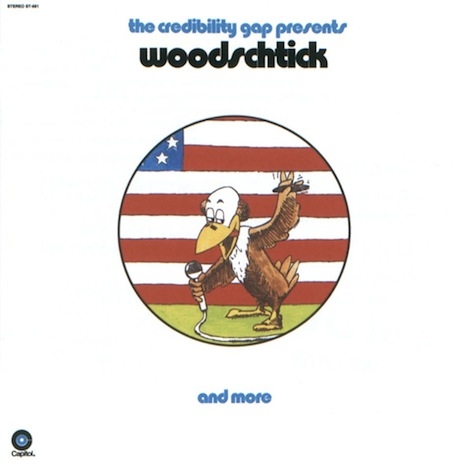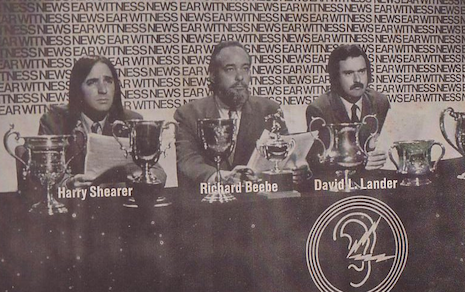
The Credibility Gap isn’t referenced all that much anymore, but in its day it was a very important comedy troupe. Its members included both Lenny and Squiggy of future Laverne and Shirley fame (Michael McKean and David L. Lander) and Harry Shearer. With two members of Spinal Tap, its pedigree needs no defending. There had been political humor, of course, including Lenny Bruce and Mort Sahl, but something about The Credibility Gap was different—it was political satire created for and by the hippie generation, and it was mainstream-ready. It took sardonic scorn at the political powers that be for granted. Its very name, a signifier for the difference between official explanations and the truth, was, as Paul Provenza pointed out, about as succinct a definition of satire as you can get.
The troupe started at Pasadena’s AM radio station KRLA, and none of its early members are today famous. It didn’t take long for young McKean, Lander, and Shearer to show up with resumes and put their ineffable stamp on the proceedings. KRLA had thought of The Credibility Gap as a hipper version of their normal news programming, but the troupe’s edge began to wear on the more conservative news directors there, and the station steadily reduced their spots until finally dropping them in 1970. At the crosstown FM station KPPC, they were given more time and freedom to pursue their demented sketches, but KPPC dropped them in 1971 as well. By that time they had worked up a reputation solid enough that they could take their act on the road.

In 1971 they released their first LP, Woodschtick and More, but their peak was probably 1974’s A Great Gift Idea, in which they poked fun at figures like Johnny Carson and Sly Stone. In “Kingpin” the concept was to imagine a Shaft-style movie about Martin Luther King Jr., as in “He’s got a plan to stick it to the Klan”:
None other than Robert Christgau himself gushed about the album even as he (rightfully) complained about the obvious imperfections of the LP as a medium for political satire (i.e. you can’t see the performers’ faces): “If its humor isn’t unprecedented—and although I am no historian of humor, I think it may be—it is at least radically different from Jose Jimenez, Mort Sahl and the First Family. Its content is different, because it avoids gags, and its form is different, because it is molded to the phonograph record. In other words, it is new comedy—post-FS. … FS refers to Firesign Theater, who if they didn’t invent this kind of humor were the first to get it on record.”
Years later, in Paul Provenza and Dan Dion’s Satiristas: Comedians, Contrarians, Raconteurs & Vulgarians, Michael McKean reminisced about the group:
The Credibility Gap really started in the wake of the RFK assassination in 1968. Everybody was pretty on edge in those days. There was the Democratic Convention in Chicago, Woodstock, and by 1970, when I got there, everybody was pretty politicized, and there was something every day. We’d wake up one day to find out we’d just invaded Cambodia, so we’d do a sketch about that. We were all pretty political, and we did little stuff and big stuff. It was fairly radical for AM radio in the sixties and early seventies. In 1971, we moved to KPPC FM in Pasadena—the other English-language station in Pasadena then—and we got a little bolder. I think we broke the word “asshole” on FM radio. That was ours. A true legacy.
The truth is, The Credibility Gap may have been bracing at the time, but the material has dated, and frankly it doesn’t hold up that well. The humor was “sophisticated” but at times surprisingly obvious—gags like referring to PBS as the “Paid Broadcasting System.” The sensibilty was miles ahead of the material itself—you could import the sensibility lock, stock, and barrel to South Park and scarcely notice the difference.
Shearer, of course, would go on to work on such illustrious projects as Fernwood 2-Night and The Simpsons and his radio program Le Show, while Micheal McKean would have a varied career in the movies and on stage, working frequently with Christopher Guest post-Spinal Tap.
In this video, which dates from 1975, late-night talk show host Tom Snyder himself generously introduces Harry Shearer’s dead-on impersonation of Snyder contending with a mismatched pair, a CIA whistleblower and the investigative reporter for Hustler magazine.
Previously on Dangerous Minds:
Spinal Tap’s IMDB rating goes to 11
LEGO ‘This Is Spinal Tap’: Nigel’s Guitar Room
The Simpsons laughing it up in Chernobyl